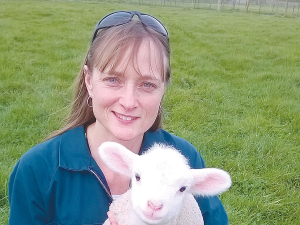NZ scientists make breakthrough in Facial Eczema research
A significant breakthrough in understanding facial eczema (FE) in livestock brings New Zealand closer to reducing the disease’s devastating impact on farmers, animals, and rural communities.
 AgResearch senior scientist Sue McCoard says the results seen in lambs fed milk replacer showed significant differences in growth rates, health and need for use of antibiotics.
AgResearch senior scientist Sue McCoard says the results seen in lambs fed milk replacer showed significant differences in growth rates, health and need for use of antibiotics.
Recently published research suggests that farmers should avoid feeding milk replacers with vegetable proteins and fats to lambs in their early life.
A milk replacer containing 100% milk-based ingredients is better for growth, health, and welfare in the first five or six weeks, the study found.
Carried out by scientists from AgResearch - and funding from NZAgbiz - the research considered the use of different compositions of milk replacers in artificial rearing systems, what it means for animal performance and health, and costs for the producer.
Around 200 East-Friesian male lambs were allocated to pens using a randomised experimental design and reared on one of two commercially available milk replacer formulations - one being 80% casein and 20% whey milk protein and 100% milk fat. The other 50% casein, 40% whey milk protein and 10% hydrolysed wheat protein and 100% vegetable oil.
The lambs were able to feed on demand from automatic feeders, with free access to grass hay also available.
Study lead author and AgResearch senior scientist Sue McCoard says the results seen in lambs fed either milk replacer were similar when it came to death rates. However significant differences were observed in growth rates, health and need for use of antibiotics.
"Among the key findings was that feeding a milk replacer containing vegetable ingredients versus 100% milk ingredients resulted in lower growth rates (242 versus 296 g/d) - with four times more lambs failing to reach the minimum weaning weight by the end of the study," she says.
"The milk replacer containing vegetable ingredients was also associated with an increased incidence of health issues - notably scouring, pneumonia, pink eye, and external infections."
McCoard adds that the cost of health intervention by lamb was $17.20 per head, compared to $7.32 per head for those fed the 100% milk ingredient replacer.
"We also saw a 2.5 times increased likelihood of therapeutic antibiotic use to treat health issues among those lambs reared on the milk replacer containing vegetable oil," she explains.
"Notably, lambs fed milk replacer containing vegetable ingredients were eight times more likely to get scours and three times more likely to get pneumonia."
McCoard says these results indicate feeding lambs in the first five to six weeks of life with milk replacer containing vegetable proteins and fats should be avoided.
"Improving early life nutrition through feeding of milk replacers containing 100% milk-based ingredients supports growth, health, and welfare by providing protection against disease and reduces costs associated with health care. The reduction in therapeutic use of antibiotics also contributes to meeting consumer demands for chemical-free food production and reducing risk of antimicrobial resistance.”
The effects of different combinations of milk replacer ingredients used in this study are still to be established.
“It is clear however from this research and other studies, that investing in the right choices around the early life nutrition of artificially reared livestock is important, and has an increasingly important role in animal agriculture,” McCoard says.
“It not only helps producers avoid costly animal health and welfare issues but can also provide an advantage for lifetime performance as well as reducing wastage which is important for sustainable and ethical livestock production systems.”
More: www.appliedanimalscience.org/article/S2590-2865(21)00039-2/fulltext
The Government's chief science advisor, Dr John Roche says the key objective for the science sector in the coming year is bedding down the reforms which sees the merger of the previous entities.
Hawke's Bay apple grower Taylor Corporation says a standout 2026 season, coming after a few difficult years, is boosting optimism among growers.
Horticulture New Zealand (HortNZ) has added its perspective to numerous primary sector voices urging the Government to strengthen its draft legislation to replace the Resource Management Act (RMA).
The Commerce Commission has finalised new information disclosure requirements for local councils and water organisations that deliver water supply and wastewater services.
Beef + Lamb NZ (B+LNZ) is calling for significant changes to the Government’s reforms to the Resource Management Act (RMA).
NZPork says the Government needs to strengthen its proposed planning laws to ensure New Zealand's pig farmers can continue to produce pork.

OPINION: The proverbial has really hit the fan in Wellington and exposed a glaring example of a double standard in…
OPINION: Dark suited spin doctors exist to, well, spin, and the nice cuddly progressive types at Greenpeace Aotearoa practice this…